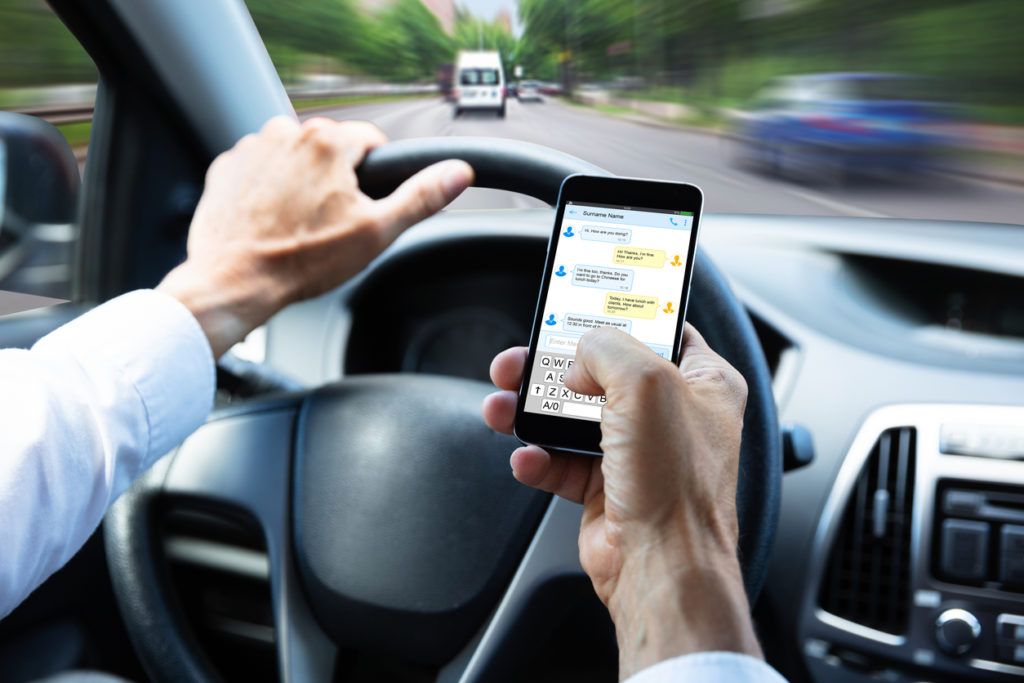Distracted Driving Awareness – Are you a part of the ‘Deadly Epidemic’?

Distracted Driver is Part of the Problem
On any day, an average of eight motorists are killed on U.S. roadways due to distracted driving. Hundreds more suffer injuries for the same reason. The rest of the drivers, passengers, bicyclists and pedestrians who do not fall victim to accidents at the hands of those talking, texting and paying attention to everything except the road are just plain lucky.
April ushers in Distracted Driving Awareness Month, a campaign by the National Safety Council – a nonprofit advocacy group – to educate the public about the deadly risks of irresponsible behavior behind the wheel. The organization says American’s highways and byways are more dangerous now than ever.
“The National Safety Council (NSC) estimate of total motor-vehicle deaths for 2021 is 46,020, up 9% from 42,339 in 2020 and up 18% from 39,107 in 2019,” according to statistics on its Web site. “Mileage in 2021 rebounded 11% from COVID-19 lows in 2020 and only lags 2019 mileage by 1%. The estimated mileage death rate in 2021 is 1.43 deaths per 100 million vehicle miles traveled, down 2% from 1.46 in 2020 but up 19% from 1.20 in 2019.”
During Distracted Driving Awareness Month, the NSC Just Drive Pledge is touted as a way to engage everyone with a driver license to take positive action.
“I pledge to Just Drive for my own safety and for others with whom I share the roads,” it states, adding that drivers also pledge to Just Drive and not:
- Talk on their phones even if it is hands-free
- Use social media
- Check emails
- Use voice-to-text technology
- Take photos
- Shoot videos
- Look up directions or use mapping software
The pledge further states that drivers will not call or message someone they know is driving.
“Drivers using cellphones are four times more likely to crash, and hands-free phone use offers no safety benefit,” the NSC states in Safety+Health, a magazine it publishes.
The National Highway Traffic Safety Administration (NHTSA) has rolled out several initiatives as well to promote Distracted Driving Awareness Month. One of them is One Text Or Call Could Wreck It All.
“Texting and driving is one of the most dangerous forms of distracted driving,” according to the NHTSA. “At any given moment across America, approximately 660,000 drivers are using or manipulating electronic devices while driving, a number that has held steady since 2010. Distracted driving has become a deadly epidemic on America’s roadways.”
As we have previously written:
There also persists an idea we humans are capable of multi-tasking at a level that our brains will not support. The human brain is a marvelous computer, but it can process only one thing at a time. The speed at which our brains process makes it seem as if we can multi-task, but the reality is completely different.
The brain treats visual, audible, physical and mental processing as tasks and it processes them separately:
- Selection – the brain tries to choose what information it will process
- Process – the actual handing out of information and instructions to the body
- Encode – the brain creates memory. You cannot process information and take ANY action without the brain storing the information in at least short term memory
- Store – the brain store the information
- Retrieve – the brain must access the information stored in memory
- Execute – the brain instructs part of the body to act on the information and then guides the necessary neurological responses to cause the action
In 2020, the latest year for which figures are available, over 2,800 died and nearly 400,000 suffered injuries in crashes where distracted drivers were the culprits.
“Distracted driving is an especially problematic trend among younger drivers,” according to the NHTSA. “In fact, 8% of drivers 15 to 19 years old involved in fatal crashes were reported as distracted. This age group has the largest proportion of drivers who were distracted at the time of the fatal crashes.”
Another NHTSA initiative, U Drive. U Text. U Pay, supports law enforcement efforts to idle distracted driving and makes the streets safer.
“Texting and other forms of messaging while driving are real dangers on America’s roads,” according to the NHTSA. “While distracted driving can take many other forms, these texting behaviors have become some of the most pervasive forms of distracted driving.”
Texting while operating a motor vehicle is illegal in 48 states, resulting in fines, points and possible revocation of driving privileges. As soon as someone starts the car and buckles the seat belt, he or she should put their phone away, preferably out of immediate reach.
“When you get behind the wheel, be an example to your family and friends by putting your phone away,” according to the NHTSA. “Just because other people do it doesn’t mean texting and driving is “normal” behavior.”
Here are a few safety tips for driving:
- Need to read or send an urgent text? Pull over, put the car in park and then deal with it.
- Have a passenger be the designated texter during the trip by allowing him or her to have access the messaging app.
- Never scroll through Facebook or other applications while driving.
- Put the phone on do not disturb or simply turn it off.
“Distracted driving is all too common,” DMV.org states. “Think about your daily commute. How many times have you looked over and seen someone looking down at his phone? Even if it’s just for a brief text, the results can be deadly. Today, it seems like there’s always something to look at other than the road. It’s tempting to try to stay connected by texting and driving, or to take a quick look at your GPS, but those actions can cost you your life or cause you to injure or kill someone else.”

Distracted Driving — Really?
Share This


